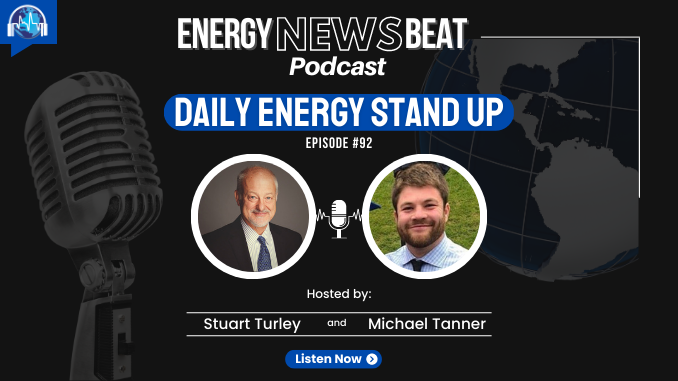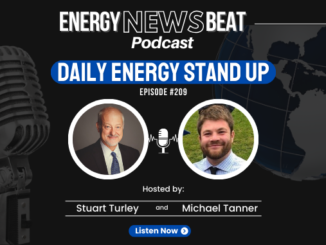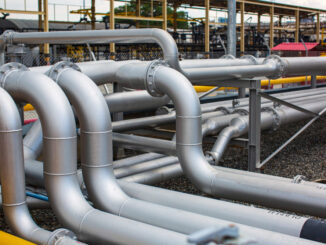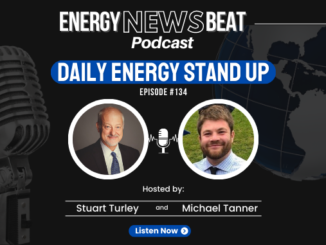
US Weighs Expanding Fed’s Emergency Liquidity Program To Stabilize First Republic, Other Regional Banks
One day after a lengthy meeting on the growing bank crisis by the Financial Stability Oversight Council (chaired by Janet Yellen who five years ago vowed there would be “no financial crises in her lifetime“) […]
As We Sell Off Our Strategic Oil Reserves, Ponder This
Authored by Bruce Wilds via Advancing Time blog, One of Biden’s answers to combating higher gas prices has been to tap into America’s oil reserves. While I was never a fan of the U.S. Strategic […]
Tow No! The Ford F-150 Lightning Struggled in Our Towing Test
Before you hitch an Airstream to your electric truck and set out to circumnavigate the country, you need to understand this: With the largest available battery pack, a fully charged 2022 Ford F-150 Lightning electric truck has […]
China’s Deep-Sea Floating Wind Platform Heads Offshore
The platform, named CNOOC Guanlan, is owned by the China National Offshore Oil Corporation (CNOOC) and is China’s first offshore wind power project with a water depth of over 100 meters and an offshore distance […]
US rakes in $263.8 mln from Gulf of Mexico drilling rights auction
Gulf offshore drilling operation A U.S. government auction of oil and gas drilling rights in the Gulf of Mexico generated $263.8 million in high bids, the most of any sale in the region for […]
Highlights of the Podcast
00:00 – Intro
01:05- U.S. Ways Expanding Fed’s Emergency Liquidity Program to Stable First Republic and Other Regional Banks.
03:33 – As we sell off our strategic oil reserves Ponder this
06:51 – Tow No! The Ford 150 Lightning struggled in our towing test
10:19 – China’s deep sea floating wind platform heads off shore
15:05 – US rakes in 263.8 million. From Gulf of Mexico drilling rights
18:04 – Outro
Follow Stuart On LinkedIn and Twitter
Follow Michael On LinkedIn and Twitter
Video Transcription edited for grammar. We disavow any errors unless they make us look better or smarter.
Michael Tanner: [00:00:14] What’s going on Everybody, welcome into a special edition of the Daily Energy News Beat. Stand Up here on this gorgeous Friday, March 31st, 2023. As always, I’m your humble correspondent, Michael Tanner, and we are coming to you from an undisclosed location here in Dallas, Texas City, I sit here with Stuart Turley, The Director publisher of world’s greatest website, EnergyNewsBeat.com. We’re going to bring you our top segments from this week. It’s a wild weeks, Stu. We had a lot of good stuff going on. Do you have a favorite this week? [00:00:43][29.2]
Stuart Turley: [00:00:45] It’s there were too many to pick. It was nuts. [00:00:47][2.8]
Michael Tanner: [00:00:49] I’m going to go with Tow No! Because it was the biggest pun one that was the Ford F-150 Electric couldn’t really pull anything. So my votes Tow No! Sure if it’ll make the top segments, but that’s for our producers decide I’m going to turn it over to them, guys. We’ll see on Monday. [00:01:04][15.0]
Stuart Turley: [00:01:05] U.S. Ways Expanding Fed’s Emergency Liquidity Program to Stable First Republic and Other Regional Banks. Michael This is a can of worms. This is almost giving license for any banker to be an idiot. And no, but maybe, maybe Mayor Pete goes and becomes a banker. I’m not sure. [00:01:26][21.3]
Michael Tanner: [00:01:26] Yeah, I don’t mean to like, call myself brilliant, but I went on a little mini rant last week on the podcast about this little fact within the announcement when they say SVP, that they will cover Treasury bonds that are in the short term that’s it. [00:01:42][15.8]
Michael Tanner: [00:01:42] That’s this program that they’re talking about in this article is the only basically be on the matter what the what the market value of your bonds are, whether or not you’ve loaded up and you’ve loaded up on Treasury bonds and rising interest rates are hurting you, which remember, we saw 25 basis points last week, too. [00:01:58][16.0]
Michael Tanner: [00:01:59] Now, the way the market looks, if interest rates have to continue to rise, which maybe not be interesting to see what happens, this is only going to get worse. And this look in this borrowing window, this liquidity financing program, if these small regional banks and larger institutions have access to is going to have to stay open indefinitely. [00:02:19][20.2]
Michael Tanner: [00:02:19] I mean, it’s just a new version of quantitative easing and it’s we’re inventing new ways to give you know, it’s not normal, it’s not QE. We can’t call quantitative easing because that’s got a stigma to it, but we can call it a emergency liquidity program or what what are they calling it, Emergency lending Facility B-T-F-P that sounds just more technical and, you know, okay, fine. [00:02:43][23.9]
Michael Tanner: [00:02:43] Quantitative easing sounds like some marketing guy spotted on you and so I think people got weary of that. This they just went too technical so we were like, okay, whatever. It’s like, no, it’s literally the same thing. [00:02:54][10.3]
Stuart Turley: [00:02:54] Yeah, but I’m I’m still not feeling groovy about this one way and. [00:02:59][4.7]
Michael Tanner: [00:03:00] Gloomy about it either. I’m just saying they’re inventing new ways to print money and, you know, it’s quantitative easing, getting off the gold standard emergency Fed lending program. I mean, what’s next? They’re just going to actually say that we’re printing money. [00:03:14][13.4]
Stuart Turley: [00:03:15] That’s exactly what it is. [00:03:15][1.0]
Michael Tanner: [00:03:16] So they’re going to come out and just say it for another 2 trillion. [00:03:20][4.4]
Stuart Turley: [00:03:21] Yeah. What’s the what’s another couple of percentage points of inflation between friends? Pakistan is up to 68% inflation right now. Oh, we’ll be right behind them here As we sell off our strategic oil reserves. Ponder this. Okay. For those aghast listeners at home, check this out. Check my mic. I did that. See that? Looking at Mike, I got to I got to I did that sound horrible. [00:03:50][29.0]
Michael Tanner: [00:03:50] Put the mic back next to you. [00:03:51][1.0]
Stuart Turley: [00:03:52] I wasn’t that better. [00:03:53][0.9]
Michael Tanner: [00:03:54] Yes, you were just you were too far away. No, that happens, guys, when you get this. What happens when your co-host was a colonel in the Civil War? [00:04:01][7.7]
Stuart Turley: [00:04:03] I was dodging a bullet. All right, we can cut that part out if you want to. [00:04:08][4.9]
Michael Tanner: [00:04:08] I don’t care. Just keep going. [00:04:09][1.0]
Stuart Turley: [00:04:10] This one of Biden’s answers to combating higher gas prices was to tap into the oil reserves. We all know that he only tapped in. Let’s go through some of those numbers. We all know how bad it is. It was the SVR was established in 1975 due to the 1973 oil embargo. [00:04:31][20.5]
Stuart Turley: [00:04:32] It is now at the lowest rate since 1980, I believe is when it is. And he basically used this to falsely lower the gasoline prices before the election, Michael, they said they would start buying it at, what, 65, 70. [00:04:51][19.5]
Michael Tanner: [00:04:52] $71 and 6920 and they can’t get funding for it. You have to you have to give them credit. They’re sticking to their guns and we’re not buying. I mean, it’s kind of crazy. [00:05:02][10.4]
Stuart Turley: [00:05:03] But they took all the money that he did and put it and spent it outside of budgets. So they basically. He stole the money and funneled it now. [00:05:13][10.4]
Michael Tanner: [00:05:14] Okay. Okay. Okay. I’m not going. Okay. [00:05:18][3.6]
Stuart Turley: [00:05:19] All right. Steal this allocation you know, whatever you want to call it they misallocated or reallocated to. [00:05:26][6.9]
Michael Tanner: [00:05:27] Those they needed that’s a big difference between stealing is stealing. [00:05:31][4.0]
Stuart Turley: [00:05:31] You know, whatever it. [00:05:34][2.0]
Michael Tanner: [00:05:34] Took. Hey, I will die on that hill. [00:05:36][1.8]
Stuart Turley: [00:05:36] No, I won’t either. I’m just. I’m really pathetically upset by this. I’m. [00:05:41][4.7]
Michael Tanner: [00:05:41] I’m upset that they’re not refilling. I mean, obviously, I think lowering the volumes of the SPR wasn’t a swift move. But you saw very you saw it was political. They want they needed to lower oil prices in order to help themselves in the midterm. [00:05:54][12.6]
Michael Tanner: [00:05:54] And quite frankly, energy inflation was getting so bad that you could have argued maybe some. That’s why you do have a little bit of reserve to help slowly tap the markets. Now, bringing it down to the levels that was at that it’s at now is a dumb idea. [00:06:08][13.8]
Michael Tanner: [00:06:09] The fact that they’re not going back and saying, hey, it’s at 71, we originally said refill at 71 and they’re not doing that. Just shows me there’s a moving target over there and they don’t really know what they’re saying. [00:06:18][9.4]
Michael Tanner: [00:06:19] They’re living in a what I would call it day by day where there’s no plan over there. They’re just saying things to get them to the next stage where then the next decision point moving forward, there’s no second, third, fourth order of thinking over there. [00:06:29][10.6]
Stuart Turley: [00:06:30] No, the only order they can think of is what they’re going to get from DoorDash that evening. They’re. It’s absolutely pathetic. [00:06:36][6.8]
Michael Tanner: [00:06:37] Door – Dash. Postmates Postmates guy so if we’re doing an ad for me, so I Postmates all the way. [00:06:47][9.4]
Stuart Turley: [00:06:48] There you go. Anyway, thanks for letting me rant. Tow No! The Ford 150 Lightning struggled in our towing test. Okay, before we get started on this story, you know, I’m a Ford guy. Love me a Ford. [00:07:01][13.7]
Michael Tanner: [00:07:02] I agree. I drive an F-150. I love that one. [00:07:05][2.8]
Stuart Turley: [00:07:06] Yeah, I missed my 250. I had a Ford 250, so. Hey, Michael, you’re familiar with where my boat is here. And you know what they call the ramp when you’re loading and unloading your boat? [00:07:18][12.7]
Michael Tanner: [00:07:19] Yup. [00:07:19][0.0]
Stuart Turley: [00:07:20] Divorce. [00:07:20][0.0]
Michael Tanner: [00:07:20] I don’t know what they call it. [00:07:21][1.0]
Stuart Turley: [00:07:21] I know they call it divorce Hill. We would go over in our golf cart and we’d get a bunch of beer and we’d sit there and we’d watch all the men drive the boat in and the women would back the trucks in or the trailers or vice versa and it is a divorce. [00:07:38][16.1]
Stuart Turley: [00:07:39] A man and a woman should be married. They should not go together. So anyway. All right. That being said, divorce hell is actually the ram. We’re going to leave all that alone. So when you take a look at lithium batteries, they’re saying that when you have a Ford F-150, lightning, it has. Consider how far you can go. [00:08:03][24.4]
Stuart Turley: [00:08:03] This test was really, really good in it. Let’s go through there. They wanted they were warned to expect the range to be cut in half when telling. But the effect of towing these travel trailers proved even more significant. [00:08:16][13.1]
Stuart Turley: [00:08:17] Even with the smallest trailer, they measured a range of only 115 miles. That figure fell to a 100 mile with a middle weight trailer and sank to 90 miles with a £7,200, you know, 7000. That’s almost nothing. I mean, think about that. With the £775 torque on tap, the electric four wheel shoves off from a stop smoothly and confidently. But it’s the lithium batteries. Wow. [00:08:48][30.4]
Michael Tanner: [00:08:49] Yeah. I mean, it doesn’t take a rocket scientist to figure out that the heavier you hang you, the heavier your load is, the less efficient your battery is going to be because you’re less fuel efficient if you’re if you’ve got more weight. So it’s like, oh, we just going to default all of a sudden now EVs can defy the laws of physics and it’s going to be just as strong. [00:09:11][21.7]
Stuart Turley: [00:09:12] My four wheeled my four wheel drive, Ford 250, got nine miles to the gallon, actually ten miles to the gallon. It was a V ten, ten miles to the gallon. Towing a boat. Not telling a boat, it was ten. Oh, yeah, it was here. It was beautiful, man. I mean, that bad dog would go up walls. It would take down. Yeah. I mean, it was an Amazon. Yeah, it was a bruiser. So anyway, but it never even noticed a boat behind it. [00:09:40][27.9]
Michael Tanner: [00:09:40] So yeah, I think it’ll be, I think it’ll be interesting. I do think you’re going to see a decent amount of demand for this because I do think there’s a marketplace for this. I think you’re going to see I think you’re going to see companies that you that I’d be eager to see construction companies roll this out inefficiently, but that still means there’s demand for it. So I do think these are going to, quote unquote, fly off the shelves. [00:10:01][21.5]
Stuart Turley: [00:10:02] I don’t have a problem with electric. I think electric is going to be great eventually. I just don’t I’m looking for the new next battery technology that. [00:10:13][10.8]
Michael Tanner: [00:10:13] I think would you buy Would you buy one of these? No. [00:10:15][2.2]
Stuart Turley: [00:10:16] How? Okay. Hey, let’s go to the next drive through here. China’s deep sea floating wind platform heads off shore. Michael, this story is absolutely Luke, as we say, in Texas. This thing is huge. [00:10:35][18.9]
Stuart Turley: [00:10:37] Let’s talk about some of the things on this floating platform. For one wind turbine, okay? It will generate 2.22 million kilowatts of clean energy annually and save nearly 10 million cubic meters of fuel gas, says Mangaung Smart Energy. All right that all sounds really good. [00:11:02][25.1]
Stuart Turley: [00:11:03] You know what this gigantic one wind turbines going out to support an empty oil derrick. This is going to be supplying electricity to oil derricks that are drilling oil and gas in the China Sea. [00:11:21][18.2]
Michael Tanner: [00:11:22] Well, I. As much as I don’t want to give credit to China for this brilliant idea. You have to. This, Stu, in my opinion, is one of the most brilliant moves you could do. Think about this Stu [00:11:35][13.5]
Stuart Turley: [00:11:36] Do what I tell Splain. [00:11:37][1.8]
Michael Tanner: [00:11:38] You know, time is. [00:11:39][0.8]
Stuart Turley: [00:11:39] Learning to me. Are you going to buy? [00:11:40][1.3]
Michael Tanner: [00:11:41] Hardest thing to get on an offshore oil rig. [00:11:43][2.5]
Stuart Turley: [00:11:44] Women. [00:11:44][0.0]
Michael Tanner: [00:11:44] Answer. [00:11:44][0.0]
Stuart Turley: [00:11:45] What women? [00:11:46][0.5]
Michael Tanner: [00:11:49] Okay. So yes. That you. You correct. You are absolutely correct that’s the first thing the second thing. That’s a good one. I didn’t even think of that would be back on point the second thing is fuel, power, electricity. Think about it. [00:12:07][17.9]
Michael Tanner: [00:12:07] They have huge generators that take up huge amounts of space that cause a huge amount of noise, that cause a huge amount of extra weight when theoretically you could have that source right next to it and completely be self-sustainable in terms of how you do that. [00:12:26][19.2]
Michael Tanner: [00:12:27] Personally, I think it’s a brilliant idea, but I think we should be doing this in the Gulf of Mexico. I don’t know. But I think this is an interesting case study in what on paper seems like a really good idea to me. [00:12:37][10.4]
Stuart Turley: [00:12:38] This is like something that I believe would be in a movie or a former secretary of state is going to be teaching in a college about Benghazi and really how to make a decision. This is dumb. And I’m sitting here sitting here kind of going. [00:12:56][18.1]
Stuart Turley: [00:12:57] When you take a look at this, Michael. Okay. A rig drills what oil and gas offshore gets a lot of natural gas. Why don’t you just burn, which they do on so many platforms they burn their own natural gas. [00:13:14][17.7]
Michael Tanner: [00:13:15] Yeah, but it’s going to. Okay, It’s. But it’s going to save you 22 million kilowatt hours and ten or excuse me, 10 million cubic feet of fuel gas, because you can’t just you can’t run those generators off the gas that you produce. That’s a that’s a huge, huge misconception. It’s fuel gas, which has to be refined. So they’re cutting out the middleman. I think this is genius. [00:13:37][21.6]
Stuart Turley: [00:13:38] I could be persuaded. I still think it’s a joke. [00:13:41][3.6]
Michael Tanner: [00:13:42] But I mean, I think. You think I don’t think this wind farm is going to power Houston, but I think a offshore wind farm that specifically is powering oil offshore oil pad. I don’t know. On paper, this seems to me kind of brilliant. You sent this story like 2 hours ago when I was like, oh, I don’t know where I fall on this one. I actually am kind of thumbs up on it. [00:14:02][20.1]
Stuart Turley: [00:14:03] I disagree. And here’s why. When you’re out in the middle of a Op-Ed, A, you can’t find anybody to date. B You’re sitting there and you’re trying to, you know, young single man on a dare, just absolutely miserable. So old married guys are happy because they’re out there. [00:14:20][17.1]
Michael Tanner: [00:14:20] Yeah, That’s your dream. [00:14:21][0.8]
Stuart Turley: [00:14:22] The dream job, you know? So when you sit back and take a look at it, you got one wind turbine, this jet, you’re putting electric motors out there and you have one wind turbine for all these platforms. I think that that’s a failure. That is a single point of failure. There’s only one that’s going to support that. I call that a oops. No, I don’t like the design on this. [00:14:47][24.5]
Michael Tanner: [00:14:47] All right. Well, we’re going to agree to disagree. We’re going to agree to disagree. [00:14:50][2.9]
Stuart Turley: [00:14:51] We’re going to follow this story. We’re going to follow this story. [00:14:54][2.7]
Michael Tanner: [00:14:54] But you got to wait till it turns out to be a genius idea. Oh. [00:14:57][2.9]
Stuart Turley: [00:15:00] That was another good one. I always love what’s his name coming around the corner. US rakes in 263.8 million. From Gulf of Mexico drilling rights. The Bureau of Ocean Management, Oh, bam! Offered 73 million acres in U.S. Outer Continental Shelf. The auction was the first in the oil rich area since 2021. Exxon snapped up more than 60 shallow water blocks. Good for them. [00:15:34][34.3]
Stuart Turley: [00:15:35] Wait a minute. Hang on. I’m getting a phone call. Yeah, Yeah. Okay. Yeah, on the phone. That was President Biden. He was grateful for the political donations. And yes, he was so happy that he got $263.8 million in his political funds. Nice. All right. Coming around the. [00:15:58][22.9]
Michael Tanner: [00:15:58] Corner. Well, I think it’s interesting. I think it’s first to say, I think there’s something that was noted in this article. You said that Exxon snapped up more than 60 shallow, shallow water blocks. Right. What they what analysts are saying is that they could be preparing for a carbon capture storage project. [00:16:12][14.0]
Michael Tanner: [00:16:13] That’s what those locations could be the company only came out, though, yesterday and today it said, quote, We are only evaluating the seismic and subsurface geology for future commercial potential. How nice would that be? Pay $15 million or whatever they paid, you know, let’s say $10 million for whatever that those 60 locations were $20 million. And if that’s solely only for science, man, that’s some expensive science. I wish I had that type of scientific budget. [00:16:40][26.8]
Stuart Turley: [00:16:41] But if it’s for us or, you know, or stroke genius. [00:16:45][4.6]
Michael Tanner: [00:16:46] It’s genius. [00:16:46][0.3]
Stuart Turley: [00:16:47] It is genius because then you’re going to be able to sell those as carbon credits, and then that’s going to pay for itself. It’s genius. Absolutely. [00:16:55][8.0]
Michael Tanner: [00:16:56] You know, there 5 to 10 year leases, you’re talking about royalty rates at 18.75%. The shallow water leases are 12.5 percentage points. The interesting part is, too, is that Chevron, you know, while Exxon’s snapping up all the shallow water blocks, Chevron is bidding on deepwater tracts. Right. 15.9 million on one deepwater track. It’s be an expensive well, I’d love to see the AFV on that bad boy. [00:17:19][23.3]
Stuart Turley: [00:17:20] Oh, no kidding. [00:17:20][0.5]
Michael Tanner: [00:17:21] A million. [00:17:21][0.3]
Stuart Turley: [00:17:22] That would be huge. You know, in the Gulf accounts for 15% of oil production and 1% of natural gas production. Wow. I thought it was a lot more than that on that gas. [00:17:33][11.3]
Michael Tanner: [00:17:34] Yeah. I mean, it’s it’s. It’s oil out there, baby. There ain’t much gas. You don’t want gas out there. You’re spending $250 million on a wells. Do you don’t want gas? [00:17:41][7.4]
Stuart Turley: [00:17:43] No. You want them? [00:17:43][0.6]
Michael Tanner: [00:17:43] Give me that crude baby with that big crude. [00:17:45][1.9]
Stuart Turley: [00:17:46] You bet! [00:17:46][0.0]



